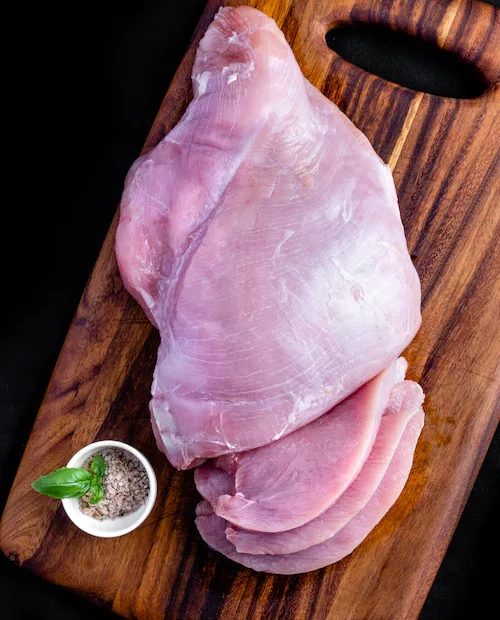Imitation crab meat, also known as surimi, is a type of seafood made from a combination of various ingredients such as starch, egg whites, and fish proteins. The proteins used in making imitation crab meat are typically sourced from low-value fish species such as pollock or whiting.
To create the imitation crab meat, the fish proteins are washed, minced, and then mixed with other ingredients to form a paste. The paste is then shaped into crab-like sticks or flakes and then cooked to give it a texture and flavor similar to real crab meat.
Is Imitation Crab Meat Vegan?
The answer to this question is no, imitation crab meat is not vegan. This is because it contains fish proteins and egg whites, which are not vegan-friendly ingredients. Although imitation crab meat does not contain any actual crab meat, it is still not considered vegan due to the use of animal-derived ingredients.
Ingredients Used in Making Imitation Crab Meat
As mentioned earlier, imitation crab meat is made from a combination of ingredients, with fish proteins and egg whites being the main components. Other ingredients used in making imitation crab meat may include:
- Starch: This is used as a binding agent to hold the mixture together.
- Sugar: This is added to enhance the flavor of the product.
- Salt: This is added for flavor and to preserve the product.
- Crab flavoring: This is added to give the product a crab-like taste.
- Colorants: These are added to give the product a red or pink color similar to real crab meat.
Is Imitation Crab Meat a Healthy Food Option?
Imitation crab meat is generally considered to be a healthy food option due to its low calorie and fat content. It is also a good source of protein and contains some essential nutrients such as selenium and vitamin B12.
However, it is important to note that imitation crab meat is often high in sodium, which can contribute to high blood pressure and other health issues. It is also a processed food and may contain additives and preservatives, which can be harmful to your health in the long run.
Differences between Real Crab Meat and Imitation Crab Meat
While imitation crab meat may have a similar taste and texture to real crab meat, there are some notable differences between the two. Real crab meat is higher in protein and lower in carbohydrates than imitation crab meat. It also contains more vitamins and minerals, such as vitamin C, zinc, and magnesium. However, real crab meat is also higher in cholesterol and may contain harmful pollutants such as mercury.
Health Benefits of Imitation Crab Meat
Although imitation crab meat is not considered a vegan food option, it still has some potential health benefits. As mentioned earlier, it is a good source of protein and contains some essential nutrients such as selenium and vitamin B12. It is also low in calories and fat, which can be beneficial for weight management.
Environmental Impact of Imitation Crab Meat
One of the advantages of imitation crab meat is that it is a more sustainable option than real crab meat. This is because it uses low-value fish species that would otherwise be discarded, reducing waste in the fishing industry. However, the production of imitation crab meat still has some environmental impact due to the energy and resources required for processing and transportation.
How to Make Vegan Crab Cakes at Home
If you’re looking for a vegan alternative to imitation crab meat, you can try making your own vegan crab cakes at home. There are various recipes available online that use ingredients such as jackfruit, tofu, or hearts of palm to create a crab-like texture and flavor.
The Ethics of Imitation Crab Meat
While imitation crab meat may not contain actual crab meat, it still raises ethical concerns for some people. The use of fish proteins and egg whites in imitation crab meat production can contribute to overfishing and animal cruelty in the fishing industry. Additionally, some people may object to the use of additives and preservatives in processed foods like imitation crab meat. If you are concerned about the ethics of your food choices, it’s important to do your research and consider alternative options.
Using Imitation Crab Meat in Recipes
Imitation crab meat can be a versatile ingredient in many recipes, from sushi rolls to salads to pasta dishes. It can be used as a substitute for real crab meat in recipes or as a stand-alone ingredient. When using imitation crab meat in recipes, it’s important to be mindful of its sodium content and adjust the seasoning accordingly. Additionally, you may want to look for brands that use fewer additives and preservatives in their products.
The Future of Seafood Alternatives
Imitation crab meat is just one example of the growing market for seafood alternatives. As concerns about overfishing, pollution, and animal welfare continue to increase, more and more people are looking for sustainable and ethical alternatives to traditional seafood products. Companies are responding by developing new plant-based and lab-grown alternatives to seafood, such as algae-based “seafood” and cultured shrimp. While these alternatives are still in the early stages of development, they could provide a more sustainable and ethical option for seafood lovers in the future.
Conclusion
In conclusion, imitation crab meat is not vegan-friendly due to the use of fish proteins and egg whites. However, it can still be a healthy food option in moderation due to its low calorie and fat content, as well as its protein and nutrient content. When consuming imitation crab meat, it’s important to be mindful of its sodium and additive content. If you’re looking for a vegan alternative, there are various recipes available for making vegan crab cakes at home.

